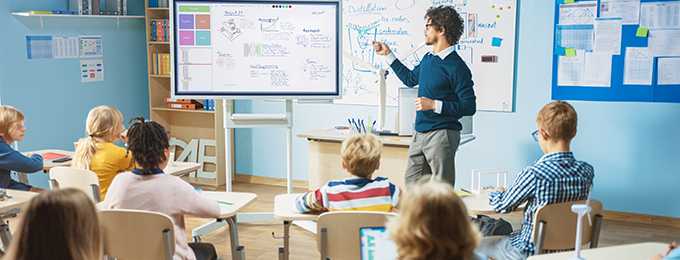The EC encourages Member States to develop a long-term approach to blended learning for the support of high quality and inclusive education and training.
On 5 August 2021, the European Commission (EC) presented a proposal for a Council recommendation on ‘blended learning for high quality and inclusive primary and secondary education’. The initiative aims at creating a common understanding of how education systems across the EU should adapt to become more inclusive and resilient, not only in the context of the COVID-19 crisis and its impact on education and training, but also in the long-term. It is based on numerous studies as well as a broad stakeholder consultation, including an open public consultation on the Digital Education Action Plan (DEAP) conducted in 2020. The Council recommendation constitutes one of the key actions of the DEAP presented by the EC last September, which aims at getting European education and training ready for the digital age. Putting innovative and flexible ways of learning and teaching at the forefront, the initiative further supports the goals of the European Education Area (EEA) to make education more inclusive, green and digital.
In order to achieve high quality and inclusive education and training in the long-term, the EC proposes that EU Member States develop a blended learning approach, which combines school-site learning with other learning environments as well as different learning tools. Such environments can include distance learning settings (physical environments away from the school-site), for instance the home, companies, the outdoors or cultural sites, whereas the learning tools can be digital or non-digital. While emphasising the importance of digital readiness, the aim of the proposal is not to replace on-site learning with online learning, but rather to achieve a well-balanced high quality and inclusive education environment, in terms of pedagogy as well as learning materials. Due to its flexible nature, blended learning can make education more accessible to disadvantaged learners, be they disabled, from rural and remote areas, or from a socio-economic unprivileged background.
The Member States are also encouraged to adopt short-term measures addressing the gaps in education and training systems exacerbated by the COVID-19 pandemic such as unpreparedness, missing interaction between teachers and pupils, lack of resources and infrastructure, as well as negative effects on the well-being of students, their families, teachers and trainers. According to the EC, increased resilience can be achieved through the provision of additional learning opportunities and targeted support to the learners; the prioritisation of the physical and mental well-being of all involved; the fostering of digital competences; and the strengthening of the digital capacity of education systems through targeted investments into digital tools and connectivity. Moreover, the mobilisation of additional staff allows for better individual support during and after school hours. In addition, partnerships between education providers for sharing infrastructure and resources can further support the preparedness of schools.
Teachers and staff in particular play a key role in designing and implementing a blended learning approach. Therefore, national governments should invest into the digital upskilling of teachers and trainers and the development of new pedagogical modules in initial and continued teacher education. Staff exchanges, peer learning, networks and collaborative projects can further contribute to the creation of a blended learning approach. The EC intends to support such efforts with several initiatives, including the new Erasmus+ Teacher Academies, the new SELFIE tool for teachers, and online platforms like School Education Gateway and eTwinning.
Apart from Erasmus+, Member States should make use of other available EU funding opportunities to complement national resources for education and training, including the Recovery and Resilience Facility, the European Social Fund+, the Digital Europe Programme, among others. Adding to these funding resources, the EC plans to develop evidence-based guidance material as well as high quality digital educational content in collaboration with the Member States. Mutual learning and exchanges shall be facilitated through the ‘Strategic framework for European cooperation in the area of education and training toward the EEA and beyond (2021-2030)’, which will also support the monitoring of the implementation of the recommendation, as well as the upcoming European Digital Education Hub and new Strategic Dialogue with Member States established under the DEAP.

